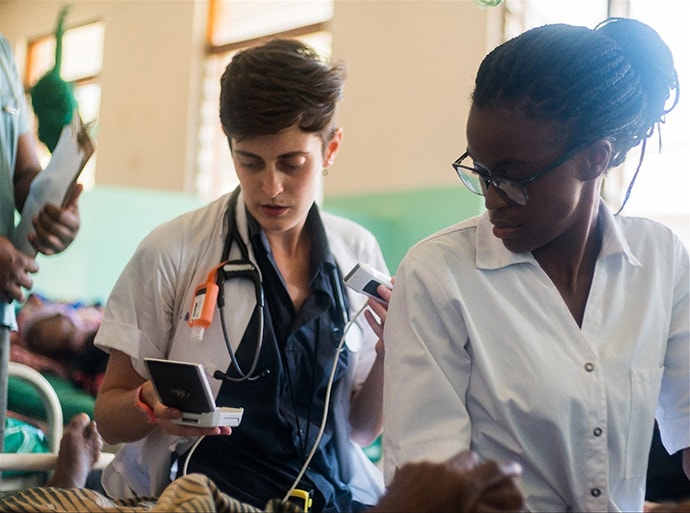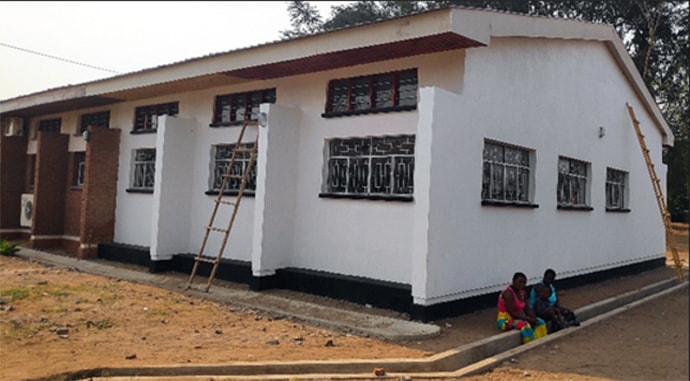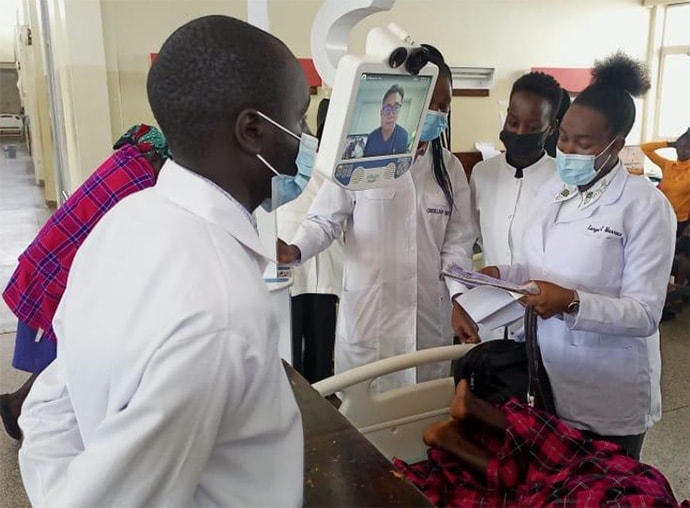By Joel Meyers, Director of Communications, GlobalWA

Providence doctor mentoring KUHeS medical student at Mangochi District Hospital. Photo courtesy of Kamuzu University of Health Sciences
You may know Providence as a US-based healthcare provider, especially if you live in the western half of the continent. In fact, they have 120,000 caregivers serving in 51 hospitals and over 1,000 clinics, senior services, supportive housing, and many other health and educational services.
Providence’s Global and Domestic Engagement department has supported healthcare practitioners around the globe since 2012 with training, mentoring, and infrastructure improvement initiatives through key partnerships.
These initiatives embody the Providence vision of “health for a better world” by responding to root causes of disparities and working through local partnerships to redress some of the health inequities created by colonization and systemic racism.
*****
I was first introduced to Providence Global Programs (the “Global” half of Global and Domestic Engagements) through Fast Pitch at our 2023 Goalmakers Conference. Fast Pitch is a segment of the conference where select members stand on stage in front of the conference audience and for two minutes introduce their organization – a fun event that showcases our members’ programs and broadens understanding. You can view a recording of Fast Pitch 2023 here (Providence Global Programs starts at 11:30).
Through Fast Pitch we learned Providence is making an impact through partnership in communities around the world and I wanted to know more and help share this wonderful program with our readers. I was able to connect with Carrie Schonwald, the Director of Providence Global Programs and through the interview we talked about the values that drive this program, the impact it is having, and the partnerships that have provided opportunities for Providence to live into its mission globally.
Guiding Principles
Providence Global Programs is both guided by and is a proud signatory of the Brocher Declaration, which states: “Rather than coming from a mindset of helping and giving, the Brocher Declaration shifts the paradigm of short-term experiences in global health to that of learning and sharing. Relationships between host countries and visitors should be mutually beneficial, with local voices and expertise of host country professionals driving the agenda for health care work.”
Carrie elaborated. She said, by signing and embracing the Declaration, “this was really to say, let’s say this loud and proud. We are about moving the needle on health equity, and equity means being community led. It means supporting the initiatives of a local partner and feeling honored by that and learning and being a learner in that rather than thinking that just because we’re American and we have money that we know more important things. There’s so very much that we don’t know.”
This approach builds bi-directional learning into all the engagements Global Programs supports. And because it’s built into the DNA of their programs, it more directly serves the local communities who have their own vision for their future.
Malawi – investing in a new generation of physicians through education and infrastructure
Since 2017, Providence Global Programs has worked in partnership with the Kamuzu University of Health Sciences (KUHeS) in Malawi and Family Medicine residency programs across the Providence footprint to facilitate bi-directional learning between Malawian and Providence Family Medicine residents. The primary goal of this bi-directional partnership is to increase the pipeline of high-quality primary care clinicians in Malawi, while providing critical training in resilience and compassionate care to US doctors.
This partnership supports the learning of Malawian trainees at both the medical school and post-graduate level, and strategically focuses on broad-spectrum family medicine, which is especially important, since there is such a low physician to patient ratio in lower resource environments. To note, there are currently fewer than 1000 doctors for over 20 million residents of Malawi.
Education
Providence funds a full-time position for a US family medicine doctor to serve as adjunct faculty for the Department of Family Medicine at KUHeS to serve the rural, 500 bed Mangochi District hospital, which is a Family Medicine training site for the department.
“The U.S. doctors are helping to manage,” Carrie explained, “the education of up to 200 clinician trainees per year in family medicine.”
She continues, “We fund US doctors to go there. The US residents go, and they support the learning and mentorship for Malawian family medicine learners. They’re not providing direct patient care. They’re not doing cowboy medicine. They are there as learners and teachers. They learn a tremendous amount from their Malawian colleagues about tropical medicine, about chronic disease management and more than anything about resiliency in a very low resource context.”
Providence also brings several Malawian family medicine medical residents, called registrars, to Seattle for six weeks every fall. These registrars do an observational clinical rotation with the Swedish First Hill Family Medicine Residency, take a University of Washington certificate program on global health leadership, and finally, present at an American Academy of Family Physicians annual conference.
Educational Infrastructure
During Covid, Providence provided five point-of-care ultrasound devices at their partner’s request and funded the training of trainers to utilize them. These devices are an incredible technological development serving across low-resource health systems. Practitioners can carry these handheld rechargeable devices and use them to diagnose a wide spectrum of medical ailments.
Providence also funded the construction of a skills simulation lab in 2021 that will provide simulation training opportunities to about 200 clinical learners a year.

Medical skills simulation lab at Mangochi District Hospital. Photo courtesy of the Dept. of Family Medicine, Kamuzu University of Health Sciences
And, Carrie stated, one of the goals of the program has started being realized, of training practitioners “who would then become the future leaders of healthcare in Malawi. Since 2017 we’ve had 10 Malawian family medicine registrars who have come through our program here, and the dream was always that those trainees would then occupy positions of healthcare leadership in Malawi, and several of them already do so. Two of the doctors from our first cohort are now faculty at KUHeS.”
Facilities Infrastructure
Providence Global Programs also supported improvements in water, hygiene and sanitation (WASH) facilities at five different clinics throughout the Mangochi District Diocese. That critical work is led by Catholic Relief Services to implement the Vatican initiative on WASH through the Dicastery to Promote Integral Human Development.
“We have provided a pretty significant amount of funding to Catholic Relief Services over the last few years to improve water, health, and sanitation facilities at five different clinics across Mangochi district,” Carrie noted. “And that’s been an incredible opportunity to branch into a different aspect of global health and improve the healthcare system for the Mangochi population in a new way.”
Building capacity globally through digital mentorship with World Telehealth Initiative
Since 2021, Providence has partnered with World Telehealth Initiative to provide a pipeline of volunteer tele-mentors for clinicians around the world in lower resource settings. World Telehealth Initiative provides a way for global clinicians to connect digitally and build clinical knowledge capacity in settings where continuing medical education and specialist consultations are very limited. Telementoring and helping clinicians using a Teladoc device (a high-resolution live-stream technology) has been very rewarding for dozens of Providence volunteers, especially during Covid. The devices are so high resolution that it really allows mentors to feel like they are in the room where their global colleagues are.

Providence doctor provides tele-consultation to providers in Longisa, Kenya. Photo courtesy of World Telehealth Initiative
Providence volunteers (Carrie informed me they volunteer a minimum of an hour per month) teach and mentor groups of clinicians at one of over twenty global locations where WTI partners. During these sessions, they arrive collaboratively at diagnoses and treatment plans, or “they may provide a specific lesson to a small group of clinicians or teach an entire class with dozens of clinicians. So, it’s very malleable and based on what the needs are at that moment for the local clinician(s) and what the skill set is of the volunteer clinician.”
Telementoring, Carrie explained, is an “incredible antidote to burnout that so many clinicians are experiencing.” And they can do it, literally, from their own living rooms.
WTI – Providence collaboration video.
Global Mentorship Initiative – telementoring non-clinicians
Also known as GMI and a GlobalWA member, Global Mentorship Initiative is another key partnership in Providence’s Global Programs portfolio.
GMI bridges the gap between graduation and first career jobs for underrepresented young professionals from diverse communities. GMI university partners nominate motivated, high potential, underrepresented students as they prepare to graduate and enter the workforce. They then match these students with mentors, in this case from Providence. The mentorship consists of 12 one-hour virtual sessions via videoconferencing and focuses on building confidence and developing soft skills transferable across any industry. Students and mentors set their own schedule. There is no obligation to maintain contact beyond the 12 weeks.
Carrie said that this partnership has been a wonderful way for their non-clinical employees, of which they have “tens and tens of thousands,” to be able to give back.
“It’s an incredibly fulfilling mentorship,” Carrie reflected, “and it’s been really great for us to be able to identify a non-clinical volunteer opportunity, because Covid very much changed the kind of opportunities we have for our employees to be able to volunteer globally. We have been so grateful to have both a clinical and a non-clinical way for our employees to serve communities around the world as this kind of service brings people closer to our mission and renews their sense of purpose in their own work.”
Health for a better world
Service and solidarity beyond borders are essential to Providence’s Mission as a not-for-profit Catholic health system. In its very DNA, the organization’s founding is a result of global outreach from the Sisters of Providence and the Sisters of St. Joseph of Orange who journeyed to the west from Montreal and France. The sisters continue to partner around the world and have always had a vision for Providence to continue partnering with communities beyond our borders.
All of these examples allow Providence to be a leader in creating “health for a better world”, whether it’s from people’s living rooms or boots on the ground.
In her closing remarks, Carrie shared that Providence Global Programs is also part of different global health coalitions both within and outside of Catholic healthcare which allows them to both learn and provide thought leadership, “What is our role in global health and how can we support critical work, or at least educate ourselves and others about that work. We’re always excited to learn about new ways that we can think about global health, and particularly to think about decolonizing and really being self-conscious about our role in global health, and not wanting to perpetuate racist systems or inequitable systems, but rather be a supporter of ongoing change in those systems. That is how we create ‘health for a better world’.”